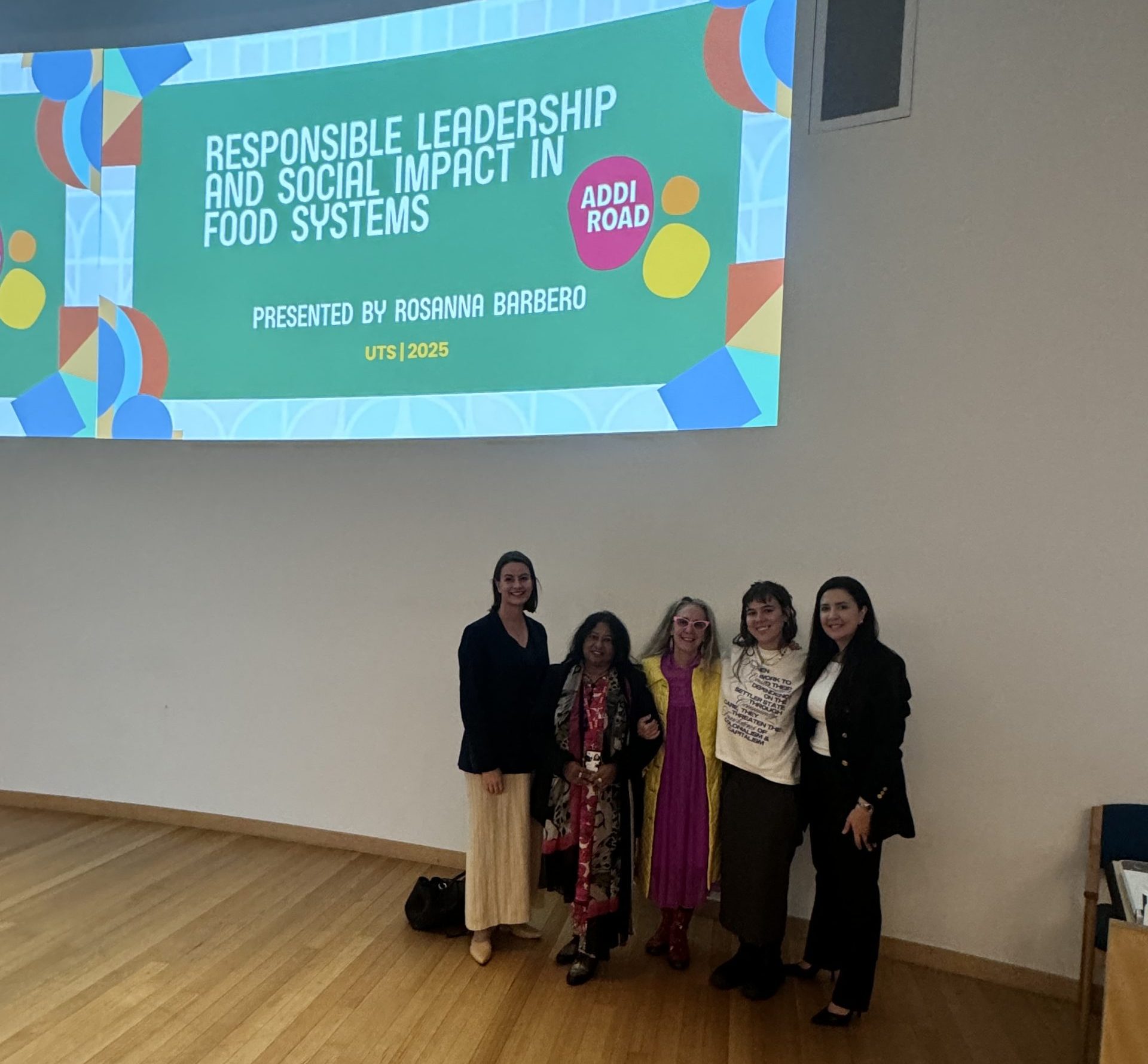When business students think about guest lectures, they typically expect corporate executives discussing quarterly earnings or market strategies. But this semester, hundreds of students in the subject Business and Social Impact were treated to a different kind of experience: a powerful presentation by Rosanna Barbero, CEO of Addi Road, sharing real-world insights about tackling food insecurity in Australia.
This was not your typical business lecture.
More than numbers on a spreadsheet
Food insecurity affects over 4 million Australians, including 1.2 million children. For many business students, these statistics remain abstract until they hear directly from leaders like Rosanna Barbero about the reality of food insecurity in their own communities.
“I thought food insecurity was just about homelessness,” admits Sarah, a third-year marketing student. “I didn’t realise it affects working families, university students, elderly people on fixed incomes. It’s everywhere, but it’s invisible.”
Addi Road, a community organisation based in Marrickville, has been addressing this challenge for over a decade through their food rescue and redistribution programs. They rescue surplus food from retailers and redistribute it to community members, diverting waste while fighting hunger.
The partnership between UTS Business School and Addi Road brought this reality directly into the classroom through a massive guest lecture featuring CEO Rosanna Barbero. Hundreds of students gathered to hear first-hand how a community organisation applies business principles to address one of Australia’s most pressing social challenges.
Learning from a social enterprise leader
The collaboration worked differently from traditional guest lectures where executives present polished case studies. Instead, Rosanna Barbero brought the raw reality of social enterprise leadership directly to students, sharing both the successes and challenges of running Addi Road.

Rosanna didn’t just talk about social impact—she showed us what it looks like in practice. Students heard directly from someone who’s built a sustainable organisation that addresses real community needs while managing complex logistics, volunteer coordination, and stakeholder relationships.
During the lecture, Barbero outlined how Addi Road operates as both a community service and a sophisticated business operation. She walked students through the complexities of supply chain management when your “suppliers” are retailers with surplus food, your “customers” are community members facing food insecurity, and your workforce is largely volunteers. Students learned about innovative approaches to challenges they’d never considered: how do you maintain food safety standards when dealing with rescued produce? How do you create sustainable funding models for free services? How do you measure impact when your goal is community dignity rather than profit?
Real leadership, real challenges
The students learned through Barbero’s presentation that food insecurity is about much more than food—it’s about dignity, community connection, and systemic inequality. Addi Road’s approach goes beyond simply distributing groceries, they create a welcoming space where community members can shop for free while maintaining their autonomy and dignity.
This insight shaped how students approached their projects. Instead of focusing solely on efficiency metrics, they considered factors like community dignity, volunteer satisfaction, and long-term sustainability.
What set Barbero’s presentation apart was her emphasis on leadership that serves community rather than shareholders. Students could see what values-driven leadership looks like in practice.
Beyond the lecture hall
The impact of Barbero’s presentation extended well beyond the lecture itself through our reflective assessment component. Students were asked to write reflectively about their own approach to tackling food insecurity in Australia, drawing connections between Rosanna’s insights and their emerging understanding of social enterprise leadership.
These reflective assessments revealed profound shifts in student thinking. Rather than proposing generic solutions, students grappled with the complexities Rosanna had outlined, such as:
- the balance between dignity and efficiency
- the challenge of sustainable funding for free services, and
- the importance of community-led approaches.
Several students have since sought out volunteer opportunities with Addi Road and other community organisations. Others have shifted their career plans toward social enterprises or organisations with social missions.
“Rosanna’s presentation changed how I think about business leadership,” says Sarah. “She showed me that the most innovative business solutions often come from addressing real social challenges.”
The guest lecture model has also influenced how the Business and Social Impact subject approaches industry engagement, prioritising speakers who can demonstrate the intersection of business skills and social purpose.
After hearing Rosanna speak, I realised that my initial idea of just ‘giving food to hungry people’ completely missed the point. She showed me that real solutions require understanding the people you’re trying to serve, building systems that preserve dignity, and creating sustainable models that can grow without losing their community focus. I want to learn how to lead like that.”
From a student’s written reflection
A model for meaningful industry engagement
Guest lectures like Barbero’s demonstrate how universities can expose students to social challenges while enhancing their business education. The presentation challenged traditional boundaries between profit-driven business and community service, showing that effective leadership often emerges at their intersection.
As the subject coordinator, I believe Rosanna’s visit represents what business education can be. Not separate from community challenges, but deeply engaged with them. Our students learn about business theory and experience how business leadership can create positive change.
For the hundreds of students who attended, the lecture offered something increasingly valuable in higher education: exposure to leaders who’ve dedicated their careers to applying business skills for social good.

Loved reading this approach which has opened student’s eyes beyond the obvious.
Having been an inner westie for many years, and active on Facebook (yes I’m old) I’m always impressed with the work of Addi Road. Even more impressed that the CEO spoke to all the first year students to expand their awareness of the challenges of the cost of living crisis in Sydney today which includes our students! Such a great intiative Rayan!